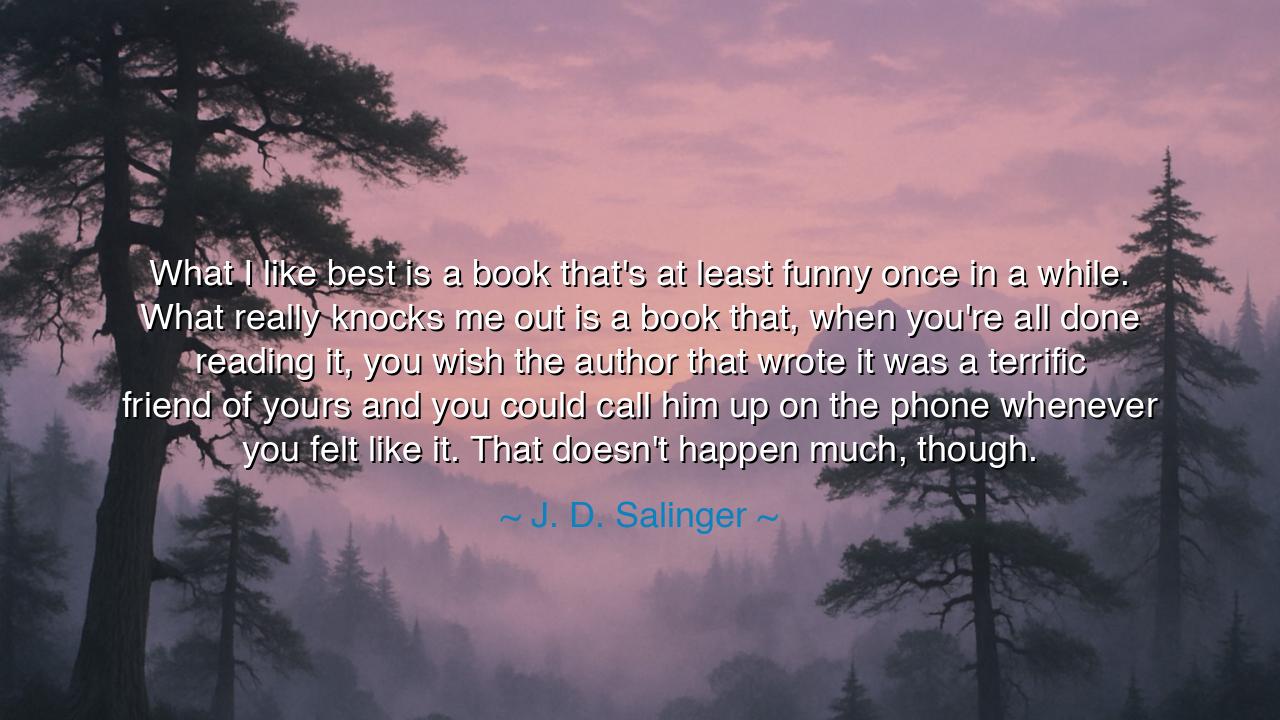
What I like best is a book that's at least funny once in a while.
What I like best is a book that's at least funny once in a while. What really knocks me out is a book that, when you're all done reading it, you wish the author that wrote it was a terrific friend of yours and you could call him up on the phone whenever you felt like it. That doesn't happen much, though.






In the words of J. D. Salinger, “What I like best is a book that's at least funny once in a while. What really knocks me out is a book that, when you're all done reading it, you wish the author that wrote it was a terrific friend of yours and you could call him up on the phone whenever you felt like it. That doesn't happen much, though.” — there speaks the eternal longing of the reader’s heart, the desire not merely for knowledge or beauty, but for connection. Salinger, that quiet chronicler of youth and solitude, unveils a truth older than the printed word: that literature, at its highest, is a form of friendship — a communion of souls across time, distance, and death.
To Salinger, a book is not only a vessel of words, but a living spirit. It breathes with the pulse of its creator, whispering thoughts that outlive the body. When he speaks of a book being “funny once in a while,” he honors the simple grace of humor — that spark of humanity that bridges writer and reader, dissolving the solemn walls of intellect. For laughter, even brief, is proof of life. It is the soul saying, “I recognize myself in you.” Thus, the books that endure are not those that lecture or impress, but those that remind us we are not alone — that somewhere, someone has felt as we do, thought as we think, stumbled as we stumble.
The meaning of this quote lies in the sacred intimacy of art. When Salinger says he wishes he could call the author “whenever you felt like it,” he is not craving conversation, but kinship — the yearning to reach across the silence between minds. This is the miracle of literature: that a stranger, long dead or distant, can speak to us as if they were sitting beside our bed in the dim hours of the night. The best writers do not instruct from on high; they walk beside us, making us laugh, ache, and wonder together. That is why, as Salinger says, such encounters “don’t happen much.” For true connection is rare — in books as in life.
The ancients, too, knew this truth. Marcus Aurelius, emperor and philosopher, wrote his Meditations not for an audience, but for himself — yet across two millennia, readers have found in those pages the voice of a friend. “Be tolerant with others and strict with yourself,” he wrote, and the words feel whispered directly into the heart. The emperor and the modern reader never met, yet they share a bond more genuine than many living friendships. This is what Salinger meant: the author who speaks truthfully and tenderly becomes a companion of the spirit, transcending the barriers of mortality.
Salinger’s own life reveals the origin of this yearning. A man who fled the noise of fame, he withdrew from the world, yet left behind characters who burned with yearning for understanding — none more so than Holden Caulfield, the restless narrator of The Catcher in the Rye. Holden’s voice, filled with humor and sorrow, makes us feel that he is confiding directly to us, not to the masses. And through Holden, Salinger himself becomes that elusive friend readers wish they could call. The man who craved solitude paradoxically created one of the most intimate voices in all of literature — the very kind of companionship he once said “doesn’t happen much.”
The lesson here, then, is profound: seek connection through authenticity. Whether in writing, in speaking, or in living, strive to touch others not with perfection, but with sincerity. Be funny once in a while, for humor is the doorway to the heart; be honest always, for honesty is the bond that endures. If you would write, paint, or speak, do so not to impress the world but to befriend it. The truest art is conversation — a reaching out of one soul to another, whispering, “I understand you.”
Therefore, my friends, when you read, read with reverence — for each book is a hand extended through time. And when you create, create with love — for someone yet unborn may find in your words the friend they never knew they needed. Do not seek grand applause; seek the quiet joy of recognition, the moment when another heart, far away, feels less alone because of you.
In the end, J. D. Salinger’s truth is simple yet eternal: the best books, like the best people, are those that make us laugh, make us think, and make us wish the connection would never end. They are the proof that even in silence, understanding can exist. And though we cannot always call their authors on the phone, their voices remain within us — steady, familiar, and kind — reminding us that friendship is not confined to time, nor to speech, but lives forever in the quiet dialogue between hearts.






AAdministratorAdministrator
Welcome, honored guests. Please leave a comment, we will respond soon